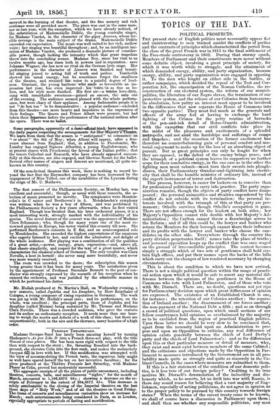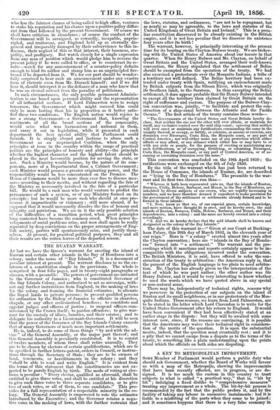TOPICS OF THE DAY.
POLITICAL PROSPECTS.
THE present state of English polities must necessarily appear flat and uninteresting to men trained amidst the oonfficts of parties and the contrasts of principles which characterized the period from the close of the great French war in 1815 to the final settlement of the Free-trade controversy in 1852. During that stormy epoch, Members of Parliament and their constituents were never without some definite object, involving a great principle of society, for which it was worth while to struggle, and the attainment of which demanded energy, ability, and party organization, because enemy, ability, and party organization were engaged in opposing it. To the men who fought on either side in the battles, or rather campaigns, which decided the repeal of the Test and Cor- poration Act, the emancipation of the Roman Catholics, the re- construction of our electoral system, the reform of our munici- palities, the liberation of our Negro slaves, the termination of our protective system, and the release of our Colonies from bureaucra- tic absolutism, how paltry an interest must appear to be involved in the differences that now separate the House of Commons into two opposite parties ! They must feel much as the generals and officers of the army feel at having to exchange the hard fighting of the Crimea for the petty routine of barracks or the pen-and-ink detail of Horse-Guards administration, with the exception that our civil conflicts take place in the midst of the pleasures and excitements of a splendid metropolis, and not amid the hardships and sufferings of camps tnenclies ; and the cessation of the former excitement has therefore no,counterbalancing gain of personal comfort and ma- terial enjoyment tomake up for the loss of an absorbing object of pursuit. But as great principles can only be fought for when they are opposed, as the defeat of the enemy brings peace and the triumph of a political system leaves its supporters no further scope for their combative energys,in the one case as in the other the fighting men must submit—must turn their swords into plough- shares, their Parliamentary thunder-and-lightning into electri- city that shall be the humble minister of ordinary life, instead of the superb instrument of terror and destruction.
This process, however, is easier for lookers-on to conceive than for professional politicians to carry into practice. The party orga- nization remains, though the objects of party conflict have disap- peared; the personal animosities and rivalries engendered by the- conflict do not subside with its termination; the personal in- terests involved with the triumph of this or that party are per- manent; Othello survives though Othello's occupation is gone. There are not offices enough for the leaders on both sides ; her Majesty's Opposition cannot ride double with her Majesty's Ad- ministration ; the Carlton cannot throw a drawbridge across to the Reform ; and if all this could be, the lawyer and banker who return the Members for their borough cannot share their influence and its profits with the lawyer and banker who choose the can- didates on the other side. Everywhere through the country the party division perpetuates itself; names take tlie place of truths ; and personal opposition keeps up the conflict that was once waged on the ground of irreconcilable principles. The contest becomes simply a struggle which of two seta of gentlemen shall hold cer- tain high offices and put their names upon the backs of the bills which carry out changes of law rendered necessary by changing circumstances.
This is about the condition to which we have now arrived. There is not a single political question within the range of practi- cal action upon which it would be safe to assert any material dif- ference between the opinions of the gentlemen in the House of Commons who vote with Lord Palmerston, and of those who vote with Mr. Disraeli. There are, no doubt, questions not yet ripe for Parliamentary decision upon which great differences of opinion are expressed. The existence of an Established Church is one, for instance ; the retention of our Colonies another ; the separa- tion of Ireland another ; the disarmament of our forces another ; the non-payment of the National Debt a fifth ; and so on through a crowd of political questions, upon which small sections of our fellow countrymen hold opinions so overbalanced by the majority as to be excluded from the region of practical English politics. Upon these latter we should be very slow to be convinced that, apart from the necessity laid upon an Administration to pro- pose and upon an Opposition to criticize, any real difference of opinion exists generally between the chiefs of Lord Derby's party and the chiefs of Lord Palmerston's : and as for differences upon this or that particular measure or detail of measure why, they exist and must exist between members of the same Cabinet; and the criticisms and objections made by the Opposition in Par- liament to measures introduced by the Government are in all pro- bability made suite as strongly and quite as sincerely in the Ca- binet Councils, in the cases where measures are submitted to them.
If this is a fair statement of the condition of our domestic poli- ties, is it less true of our foreign policy ? Crediting to its true motives Mr. Disraeli's denunciation of the imbecility and dis- honesty which, as he asserts let us drift into war with Russia, is there any sound reason for believing that a vast majority of Eng- lishmen, especially of acting politicians, do not agree in opinion as to the proper policy to be pursued by this country towards foreign states ? When the terms of the recent treaty come to be known, we shall of course have a discussion in Parliament upon them ; and shall then see whether any responsible politician, any man who has the faintest chance of being called to high office, ventures to stake his reputation and his chance upon a positive policy differ- ent from that followed by the present Government. Of course we shall have criticism in abundance ; of course the conduct of the Government will be arraigned, as cowardly, incapable, unprin- cipled, and traitorous, and England held up as eternally dis- graced and irreparably damaged by their subservience to this in- fluence, their neglect of this or that interest, their baseness, stu- pidity, and profligacy. But watch closely for a single expression from any man of position which would pledge him to reverse the present policy if he were called to office, or to counteract its re- sults—watch for any announcement of a counter-policy definite enough to bind its author and stamp him as an unprincipled fire- brand if he departed from it. We for our part should be wonder- fully surprised to hear such an announcement under any evasive form of rhetoric even from Mr. Disraeli himself; and if we did hear it, should interpret it as the defiance of a man who knew that he was an eternal outcast from the paradise of politicians.
• In such circumstances, the only possible permanent Adminis- tration is one based upon personal ability and the representation of all influential sections. If Lord Palmerston were to resign tomorrow, the Government which might succeed him could only be more lasting than his in proportion as it better satis- fied these two conditions. The English nation would rejoice to see a strong Government—a Government that, knowing the sentiments of all the broad sections of the community, would seize what was harmonious and national in them, and carry it out in legislation, while it presented in each department the best special ability. that Parliament could furnish. It is simply absurd and factious to abuse such a Government as an unprincipled Coalition, when the only principles at issue in the country within the range of practical politics are the principles of honesty and ability—the principle whether the highest character and the highest talent should be placed in the most favourable position for serving the state, or not. Such a Ministry would become, by the nature of its com- ponents, more of a Departmental than a Cabinet Government ; each Minister would possess a greater originating power, and the responsibility would. be less concentrated on the Premier. The House of Commons would be more than ever free to discuss mea- sures according to their merits, and without regarding the fate of the Ministry as necessarily involved in the fate of a particular bill. He would be a rash man who would venture to predict the permanence of such a system, or of any Ministry formed on its principle ; but he would be more rash who should at once pro- nounce it impracticable or visionary ; still more absurd, if he supposed that it would necessarily dissolve the ties of honour and integrity and patriotism. We see in it the only possible solution of the difficulties of a transition period, when great principles long contested have become the common creed. When newer de- velopments of social problems arise, and men shall again be really separated by deep convictions on the proper arrangements of Eng- lish society, parties will spontaneously arise, and justify them- selves. At present, for practical political purposes, they and all their results are the rotten leaves of the departed season.



























 Previous page
Previous page